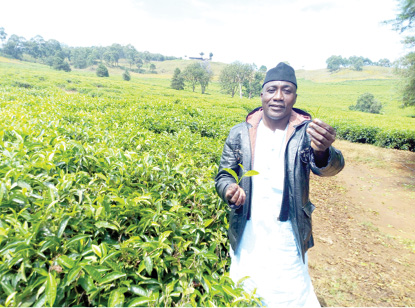The Mambila Plateau is an important agricultural town in Taraba State. With a unique Europe-type weather condition, it is home to thousands of tea farmers and ranchers.
Located in Sardauna Local Government Area of the state, it hosts the Mambila Beverages Nigeria Limited (MBNL), makers of Highland Tea (often referred to as Mambila Tea).
Mambila Beverages came into existence when the Taraba State Government bought over the Nigeria Beverages Production Company Limited (NBPCL), jointly owned by the defunct Gongola State Government, Northern Nigeria Development Corporation (NNDC) and the Nigerian Agricultural Bank (NAB) which started operation in 1982.
The revamped tea company was incorporated to handle the growing and marketing of tea, coffee and other forms of beverages, but it has not commenced production of coffee and other beverages yet.
Located in Kakara Village on the plateau, the company has Highland Tea Estate, about 615 hectares of tea plantation, and a processing factory with the capacity of producing 1.6 million kilogrammes of tea annually.
The company’s Head of Personnel, S.P. Ishaya, said the company was warming up to diversify into coffee production, adding that plans had also been concluded to begin the production of green tea in packs as against what they currently did in porches.
Ishaya said the company had about 2,000 outgrowers cultivating about 800 hectares spread across all the villages on the plateau who supplied green tea leaves to the company.
The Governor of Taraba State, Darius Ishaku, who owns a tea farm he bought and took over through the Bank of Agriculture (BOA) along Gembu Road, was billed to visit the Highland Tea factory to commission the new equipment the company acquired when Daily Trust visited.
Daily Trust went into some of the villages in the area to interact and gauge the pulses of the farmers on how they fared economically with the presence of the company in the area, and their story is that of gains, pains and exploitation.
The President of the Association of Small Scale Tea Growers of Nigeria (ASSTGN) in the area, Dr. Usman Hassan Kakara, and the Secretary General of the National Coffee/Tea Association of Nigeria (NC/TAN) shared with Daily Trust the fortunes of tea farmers then and now.
Dr. Kakara said when Kenyans were managing the defunct Nigerian Beverages Limited (NBL), now Mambila Beverages Limited (MBL), they introduced a system of tea cultivation by smallholders in the communities to boost their standard of living and also boost the industry.
He said in 1993, the European Economic Commission (EEC) came in to boost tea production in Nigeria and that it turned around the fortunes of many farmers by putting millions in their pockets.
“What they did was to introduce tea production to small scale growers. They expanded it from seven to 10 villages and subsequently to the current 27 villages. They also expanded it from a 150-member outgrowers to over 2,700 members.
“EEC raised tea seeds massively and distributed to farmers. Then, this place was booming, because every two weeks, our farmers would have N2 million to N5 million. That was from 1993 to 1995,” Dr. Hassan said.
He further said EEC’s intention was to create a separate processing factory for the outgrowers, but that during the Abacha regime, Nigeria was sanctioned, and that by 1995, EEC terminated its programme.
“The withdrawal of EEC drastically affected the communities as it was buying a kilogramme of green tea at N12. When they left, there was nothing Highland tea could do.
“Presently, MBL has its farms and processing machines, so they cannot absorb all the farmers. It is now rotational plucking. This week they pluck to the North, another week they collect from the South, another week they collect from the West,” he lamented.
Dr. Kakara stressed that for the farmers, something they used to harvest every two weeks dragged to 20 days and that by the time they harvest it, finding market became difficult because Highland Tea would not collect it; and so farmers were left with no option but to abandon the tea plantations for other crops. They either intercropped it with eucalyptus or pear or food crops.
At the moment, farmers are not comfortable with the current price Highland Tea offers them in the area.
“They were buying green leaves during the EEC at the rate of N12, and today, after 20 years, Highland Tea still buys a kg at the rate of N30. Out of that N30, the person that harvests it for you, you pay him N15 per kg, what are you left with?
“In my farm, we harvest 10,000 kg which we sell at the rate of N300,000 and we have to pay N150,000 to the workers instantly, let alone farm maintenance, chemicals, paying security men, slashing and other things. So you find out that if you are not involved personally, it is not encouraging.
“If Highland Tea buys 20,000 kg of green tea to process from the farmers at the rate of 600,000, they will get 120 bags of assorted tea. If you convert and sell it as BP, DI, dust and the fibre, from what they bought from the farmers at N600, 000, they get over N3 million. The margin is so wide,” the union leader stressed.
Alhaji Salihu Lamu Mbu, who is one of the big tea farmers in Kakara, also told Daily Trust that the absence of competitors and other buyers made it easier for Highland Tea to take advantage of the farmers.
Alh. Salihu reiterated that his attempt to fight for the farmers resulted in several litigations with the company and that they are still in court.
Mbu said if other tea makers or investors come to buy or work with the farmers to build up a processing factory, it would turn things around, but that at the moment, they were at crossroads.
Mbu said he did not sell his tea to Highland Tea anymore because of “undue economic exploitation of the farmers”, adding that the company had also devised a means of preventing the farmers from getting maximum benefits from their farms because they dictated the number of leaves to be picked thereby reducing the quantity a farmer could get.
Another farmer, Mallam Lamu, who was making over N1m monthly crushing his tea himself, narrated how he was frustrated by the company because he was protecting the farmers from undue exploitation.
Mallam Lamu said he did not crush his tea any longer even though his tea farms still throve and that market remained a huge challenge.
Daily Trust on Sunday sought to get the comment of the company, but the Public Relations Officer (PRO) of the company insisted that the MD/CEO, Mr. Timothy Fanya, was not disposed to attend to the reporter because he was planning for the governor’s visit to the tea estate the following day, even though he was earlier given an appointment.
However, many of the farmers who spoke to Daily Trust on Sunday, believe that if there are investments in the Mambila tea plantation by other stakeholders or investors, millions of naira will find their way back to their pockets again.
Until that happens, the farmers will continue to groan under low prices, while some plan to develop other avenues to improve their income.




